Nov
14
REMEMBERING VETS
Filed Under American Patriotism, Family, Peace, PTSD treatment, Tears of a Warrior, Veteran's Day, War | Comments Off on REMEMBERING VETS
by Janet J. Seahorn, Ph.D
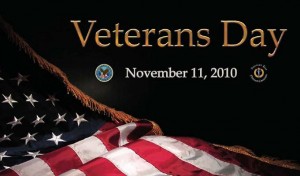
It is cold outside.
I just got home from my last lecture session. Needless to say it was quite interesting as the entire week I have been battling a bad cold and struggling with losing my voice.
Today, there was no voice. Trying to deliver a lecture with laryngitis is a challenge. Hence, I put all of my “words” on my wonderful PowerPoint and proceeded with the lesson.
Since the week is Veteran’s Day week, I decided I would do something different for my university classes. I would talk about the LITERACY of WAR: the vocabulary, the literature, the stories, and of course, the effects of war on both the veteran and the families.
My first slide said this:
My husband is a Vietnam veteran who was a young officer and served in the jungles between the borders of Cambodia and Vietnam. He witnessed a great deal of bloody battles and lost many men. He has two Purple Hearts. The last one he received after being severely wounded. Out of 130 men, only 19 walked away without any injuries. The rest were either killed or wounded. Yesterday I asked if he would like to be the guest speaker for today’s class since I have no voice. His response is what he said he would tell you,
“My wife thinks I’m not miserable enough, so she wants me to talk about PTSD for 90 minutes.”
He said some other things he might share with you, at which time I decided his services would not be needed! (I would like to keep my job.)
Of course my students thought this was pretty funny, even if it was true. But the purpose of this blog is to share with you what I learned from my students. It is pretty sobering.
Out of 140 students, only five had ever had a college session where the professor talked about or honored veterans on Veteran’s Day.
Most students were interested in the session’s information and videos. A few, however, during the first short video paid more attention to their text messages than to the video. Then I put on a slide, “How well did you listen and honor our veterans during the show?” The room was incredible still. The other short clips received 100% of their attention.
- Young people are not insensitive to veterans, I believe their seeming thoughtlessness is not that at all… it is because the adults around them do not take the time to talk WITH them, or to REMIND them of the sacrifices others have made FOR them. Schools, communities, and parents are the ones most at fault. Many have lived the experience and stayed silent. No longer will I remain soundless. I will always give this presentation in the coming years.
- We did an activity where students moved forward when I asked a question if a relative had served, was injured, or died in a particular war. Many took a step when I mentioned WWII. More stepped forward again when I mentioned Vietnam. And last, when I asked about the Iraq/Afghanistan conflict, I was surprised at how many were impacted. Last, I asked for those who had or were currently serving in today’s wars, four stepped forward. I had them face the class so all would see. Then I began clapping and the entire class gave these four young men a standing ovation for their service. It was an emotional moment for everyone.
At the end of class two of the young men commented that this was the first time anyone had acknowledged and thanked them for their service. Today was the first of what I hope will be many. And just as important 140 young people may stop every now and then, think about those who gave and are giving so much, and say a prayer of gratitude.
Perhaps, when they see a vet or know of a family member who has served they will say Thank You.
A few have already called home and done just that.
Nov
9
THERE WILL ALWAYS BE
Filed Under Family, Peace, Tears of a Warrior, Trauma, Wisdom | Comments Off on THERE WILL ALWAYS BE
by Janet J. Seahorn, Ph.D
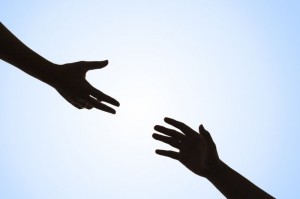
It is hard to believe that another holiday season is upon us, beginning with Thanksgiving and ending with the celebration of a New Year. With this period comes the challenge of facing the days with too much to do or too much idle time, too many people to be around or too much loneliness, and the memories of past holidays spent in combat or loss. For some, these are anniversaries of death and destruction. They may not bring joy and goodwill, but sadness and loss.
So, I write today’s blog to remind myself and perhaps others confronted by the days ahead to not be afraid of the darkness. It is not about getting rid of the shadows but getting beyond them. Stepping into sunlight, even a small glint is enough to dispel some of our gloom. As human beings we were not meant to stay in sadness but to shine, in spite of our troubles and hurts. Hard to believe, but nonetheless true.
The only way I can ever get beyond the shadows is to look up; to search for the pure, the just, and the beautiful. To focus on what can be if I keep moving forward. I do not have to center my thoughts only on what has been lost, but what is waiting to be gained if only I believe. Believe in the goodness of others; they abundantly surround us waiting to enter our life. Believe in a more loving world even when the media fill the airways with ugliness. Believe that as we search for the decent we find it in the softness of a breeze, the melody of a song, or the laughter of a child.
A few months ago my sister gave me a CD by the Canadian Tenors. On the album is a lovely song with a chorus all of us can use at sometime in our lives:
There will always be a shining star;
There will always be the rising of the sea;
There will always be an angel watching over me…
And angels voices say to us, these things will never die.
Choose to believe the skies are filled with shining stars even if clouds conceal them. The seas and oceans rise and fall with the changing tides. Most comforting of all is choosing to believe that there will always be angels watching over us… and these things will never die. So if you wander into that dark place, remind yourself of those angels, the thousands of shining stars, and perhaps you will be the tender hand reaching out to hold another being in need of your light.
Oct
27
NOT YET, NOT YET
Filed Under Black Lions, Combat PTSD, Family, PTSD, Trauma, Vietnam Reunion, War | Comments Off on NOT YET, NOT YET

“Not yet, not yet.” These were the words a mother of a soldier who returned from war with severe, incapacitating PTSD composed to her son’s commanding officer almost forty years later. The mother wrote from a voice in heaven, as if her son had died, because in many ways he had – died emotionally; died cognitively; and died in spirit. Years had passed and she wanted his leader to know how much her son admired the man. How much he believed the officer had done everything possible to prevent the ambush that cost the lives of sixty-four troops. A dispensation of grace, for through her son’s stories, the mother realized how much trauma and burden the officer must be carrying from such a massive loss of life.
Even after four decades the pain and memories still persist as if the battle had just occurred. I am left to wonder how long a human being must or can endure such heartache. Being in charge of the lives of others is an incredible responsibility. A responsibility that makes losing those he led more devastating. One death would have been terrible, but sixty-four is beyond measure.
We heard the story while attending a reunion of the Black Lions who served in Vietnam. The get-together was a relatively small gathering compared to many war reunions. Small because the Black Lions were an elite unit of soldiers who traveled light both in men and equipment. And smaller still because so many had died during the many jungle encounters with the enemy.
Almost every survivor had a story and every attendee had an inner strength that somehow allowed him to live forward each day until now. I only hope that at this point, the time that remains in these old warrior lives can be lived with great joy, peace and personal forgiveness if needed. Our veterans deserve a bit of these gifts and so do their families. So when the mother wrote, “Not yet, not yet,” meaning… do not leave this earth too soon, the same words persist, “not yet, not yet”, the time for personal healing is now!
Blessings and God Bless our vets young and old.
Sep
21
FAMILY STRENGTH
Filed Under Family, PTSD, Tears of a Warrior, Treating PTSD, Wisdom | Comments Off on FAMILY STRENGTH
by Janet J. Seahorn, Ph.D
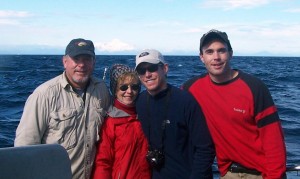
It is obvious that living with PTSD is a challenging journey. We hear so much about what doesn’t work, I wanted to take this time to talk about what does. The media seems ready to publicize the ugly side of trauma, yet it fails to show the other face of the family story – the good side. What those of us who have and are still learning from the PTSD experience, is the fact that the unpredictability of the memories and behaviors are what makes the struggle so darn difficult.
So what does work? 1). Listening. Gosh, this is something few people do very well, including those who don’t have to live with PTSD. 2). Sharing. Sharing what is needed for others to recognize where each member of the family stands. Sharing doesn’t mean spilling every tiny detail of your existence, only the things that are required for understanding. 3). Problem Solving. One person is rarely the only source of a family conflict. The biggest trick to effective problem solving is to spend 10% of time defining and discussing the problem and 90% of the time working it out. For many of us, we often do just the opposite. Last, and probably the most important, is the deep desire to get better and be better. No excuses. No blaming; just a lot of personal and joint effort.
If we pay close attention to what is working, as well as what isn’t, we may be able to replicate those positive moments. Focus on duplicating what we are doing right. Even if these strategies don’t work all the time, for most of the daily living together, it may be “good enough”. And right now, I’ll take that as personal success.
Sep
5
IF YOU’RE NOT OK, THEN WE’RE NOT OK
Filed Under Black Lions, Brain Injury, Combat PTSD, Family, Life, PTSD, PTSD treatment, Tears of a Warrior, Treating PTSD, War | Comments Off on IF YOU’RE NOT OK, THEN WE’RE NOT OK
by Janet J. Seahorn
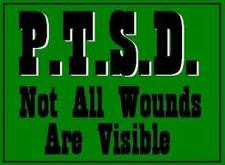
Every day there are more and more wounded victims of war. These are the spouses, the children, the parents, the sisters and brothers of the veteran… and the list grows. It is one reason that we continually urge those impacted by serving in a war zone to get help as soon as possible if they begin to feel the “fall out” effects of combat.
There are centuries of evidence that prove this point. When a person returns from a traumatic experience and normal life is no longer normal, those around will become part of the trauma. It is an obvious statement, yet, there are too many veterans and families that refuse to acknowledge and deal with the situation.
It is like having an elephant in the room that no one wants to recognize or admit is there. The unrealistic thinking goes something like this… “If I just ignore the large problem, it will eventually go away”. The only problem with the problem is that it does not go away, in fact, it often grows bigger and bigger. And it begins to become more active. Imagine having a raging elephant in the room charging around with its large tusk and huge trunk. Wow, and I haven’t even mentioned all the crap it leaves lying around. It feeds on everything in sight, so eventually your house is a mess and you don’t have a safe place to hide from the growing beast.
Human nature seeks coherence and peace, even in the most chaotic of times. It is always looking for that which is safe and enjoyable. It craves stability and excitement, joy and delight. When these are absent for long periods of time, it is easy for depression and hopelessness to set in. You see, if someone you deeply care about is not OK, then it is quite challenging for you to be OK. And if both of us are not OK, then WE, as a couple, a family, a relationship, are not OK! Herein lies the hard choice — you can either accept the “crap” and continue on the path you may currently be on, or you can make another choice. A choice that can lead to healing. A choice that may allow the relationship to be more positive and loving. A choice that begins to do something about THAT elephant in the room.
Either way, we all choose which way we will continue our journey. Whatever choice we make will not be an easy path. However, one definitely has more constructive possibilities than the other. We persistently mention that if children are involved, than getting the elephant out of the room is crucial to their well-being and healthy development. As adults, we make our own choices, but children are subject to the outcomes of our choices. More than likely, they don’t get to have a voice; they are the helpless victims of our selection, good and bad. Therefore, think deeply about what you are and are not doing. Your children’s lives depend on which options you make.
For some of us, we didn’t have the information about PTSD, TBIs (Traumatic Brain Injuries), and other impacts of war. We did the best we could; at least, we want to hope we did. New military personnel have better information. They can and must make better choices, if not for themselves, for their children and the future of our next generation. Healthy life truly depends on this choice.
Aug
11
STAYING OUT OF THE SAD SACK
Filed Under Combat PTSD, Family, Healing Waters, Peace, Pets, PTSD treatment, Tears of a Warrior, War | Comments Off on STAYING OUT OF THE SAD SACK
by Janet J. Seahorn
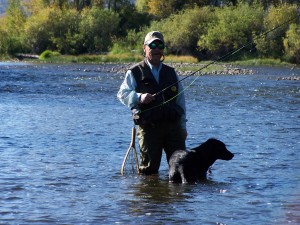
A few weeks ago we had the rare opportunity for my family to get together and spend some quality time floating, fishing, and just chilling out in Wyoming.
During one of our chats, my brother, a Vietnam Navy vet, started talking about how hard it is to stay out of the “Sad Sack”, especially when his PTSD starts rearing it’s nasty head.
Although it is not realistic to expect that any of us can totally avoid jumping into this particular “sack”, it is wise to try and do something more inspiring than hanging out in the land of gloom.
Go for a walk, listen to music, write, or take up pottery or painting… or fishing. Anything that can help take your mind off of the misery.
One Vietnam vet I recently heard from talked about some of the projects he has done and continues to do for the children in Vietnam.
So far he has built one kindergarden in honor of his best friend who was killed in combat forty years ago. He has another one in process, and has helped do the fund raising and building of a library to honor another high school classmate killed during the same conflict. By giving something positive back to the world, he declares, allows him to keep his ghosts in line. Gosh, organizing, fund raising, and constructing these amazing projects is a pretty impressive way to stay out of the Sad Sack.
I must admit that some of our sibling conversations made me go into the “Jovial, Laughing Sack” which seemed to annoy the others in the car just a much as if I were in the Sad Sack.
Seems like when only one person in the group finds a subject humorous, others give you that disgusting look that says “stuff” the mirth. Dang, now I couldn’t open my Sad Sack and couldn’t stay in my Laughing Sack, which, by the way, made me burst into even more hilarity
At any rate, the whole point of this message is that we live in and wear many sacks throughout our days. Some we consciously choose, a few tackle us when we least expect them, throwing our emotions into chaos. The challenge is to get out of the bad stuff as quickly as possible.
The lesson is to trust our faith and strength, realizing that just as the crappy stuff sometimes engulfs us, the wonderful, comical, and joyful is waiting for us to return to the good stuff. In a recent blog, Ancient Wisdom, we wrote about being strong.
So here it is, being strong will not prevent you from somersaulting into the Sad Sack, however, being strong will be the only thing that will get you out into something better.
You have the power and strength to reduce the size of your sacks, whichever ones you choose. Good Luck.
Jul
12
TEARS OF A MOTHER
Filed Under American Patriotism, Combat PTSD, Family, Tears of a Warrior | Comments Off on TEARS OF A MOTHER

by Janet J. Seahorn
It came in the mail, a letter from a mother of a young vet who has already served a year of duty in Afghanistan. Even though we receive numerous letters from mothers, wives, vets, and even their children, this one kept coming back to my mind. Her words echoed the immense sacrifice families contribute when their loved one(s) serve in the military.
Given the current state of the economy, many military personnel cannot find employment once they are out of the armed forces. Some are left with few viable options to support themselves and/or their families except to re-enlist. This is the situation her son finds himself in now. Having to think about him returning to Afghanistan where every day becomes a bit grimmer is an alarming prospect.
What made her letter resonate familiar memories in me was going back to a time when I, as a young girl, watched and listened to the emotional rollercoaster my Mom (and Dad) went through while my brother was in Vietnam. Some nights when Dad was working late and she thought I was already asleep, I could hear her muffled crying. I am sure she was sobbing into her pillow to reduce the noise of her tears. It broke my heart because I knew there was little I could do to comfort her worries.
Later, after my brother returned home carrying the burdens of war, my mother faced another challenge – how to soothe, support, and deal with a young man who was very different from the happy-go-lucky son she once knew.
The tears continued as did the worries, for she understood that this new battle waging inside of my brother was just as formidable as those he faced in combat. And she understood, once again, there was little she could do to alter my brother’s new journey. She could be present to offer love and the stability of home, but he must be the one to do the work of emotional healing.
Combat’s wounds continue to take an enormous toil on the entire family, not just the vet. Such grief still continues to be done in silence, for vets and their families have long intuitively understood that few people who have not been in their position have a clue about what is occurring, every part of every day. Even if someone was willing to listen, how could one put into words the many hidden demons that returned as part of the baggage of war?
So many tears, so many wounds, and so much healing work still to be done. As long as war is part of our world, there will always be the sacred “Tears of a Mother”.
We need to remember to keep these gentle souls in our own hearts and prayers, and, perhaps somewhere in the distant future, there will no longer be a need for tears to be shed because of war, greed, or some leaders’ insatiable need for power.
When and if such a state of affairs ever happens, tears might be replaced with joyfulness and peace. We can only hope.
Jun
24
PTSD Series Discussion #4
Filed Under Combat PTSD, Events, Family, PTSD, Tears of a Warrior, War | Comments Off on PTSD Series Discussion #4
by Janet J. Seahorn

How can we talk about PTSD as a family?
Gosh, this is a tricky question with an even trickier answer. As we have discussed in most of the prior questions, the first step is to acknowledge that upon returning from combat things aren’t quite normal. Become informed about the signs and symptoms of PTSD. Be honest as much as you can about what each of you is feeling. As the service person, you don’t have to go into all of the horrible details of your experiences, but you do and will need to discuss the truth that your military life in a combat zone may have been pretty distressing; that what you saw and did was often unsettling.
As the significant other or spouse, your role initially is to just listen. Try not to ask too many questions. Sometimes it may seem you are prying. Try and wait a bit before going into the details. But it is crucial, as a family, to talk. Silence is simply not an option. It creates distance by making assumptions about behaviors that may not be accurate.
In our book, we describe an incident where a young man who had been in several roadside bombings returned home from Iraq. On a quiet Saturday afternoon, the family decided to take a trip out of town to a favorite shopping center. It was to be a fun outing of togetherness. Things were going well until the young family came to bridge where a man waving for help was standing by the roadside next to a car with a flat tire. The wife suggested they stop and help, however, the young serviceperson immediately turned his vehicle around in the middle of the road, angrily stomped on the gas and headed home. Not knowing what was happening, the wife assumed her husband was acting unreasonably. It was a silent ride back to town. The young vet never told his wife what was going on in his mind. Later, during his scheduled visit to his VA counselor he retold the story. He knew his wife and children were upset with him for ruining their fun afternoon. However, what he saw was not an ordinary man with a flat tire needing help. What his mind and body saw and felt was a possible setup for an IED (Improvised Explosive Device). He had seen this many times during his tour of duty in Iraq. He had two thoughts to keep his family out of harms way: 1) He could shoot the “terrorist” standing on the roadside, or 2) He could, without delay, get his family away from the danger zone. Understanding that shooting the “threat” was probably not the best decision, he chose option two. Makes perfect sense, but without talking he went home angry and upset. And his family had no clue as to what had just occurred.
In our book we advise “If you care, you share”. Sharing creates understanding. Understanding generates compassion. And compassion establishes hope and protects the relationship.
Another word of advice about discussing a concern: Never try and sit down to talk over an issue when one or both parties are in a full pitch of rage or anger. You can’t stop a charging bear… it is already on a mission to attack. You must wait until tempers are calmer and conditions settle down enough to have a reasonably calm and “adult” discussion. If a blaming game begins, stop immediately. Blaming never solves the problem; it only throws more fuel on a hot fire. Use “I” statements such as, “I start to feel afraid when I see you getting angry and I don’t understand why?” or “It is hard for me to go to family events without you. I miss doing things together and want to know what I can do to make it OK for you to attend some of our family get-togethers.”
Most of our family conversations, once we began to understand what we were facing, resulted in a compromise that everyone could agree would make the situation better for all involved. We now try not to live on assumptions by doing a reality check with the person. For family events, every person becomes responsible for him or herself. Sometimes my husband chooses downtime away from a houseful of noisy people. He goes to a quiet room to watch TV or read a book while the rest of us play a rowdy game of Pictionary or Shout It Out. This is a Win/Win for everyone and is absolutely acceptable behavior.
Jun
3
Memorial Day in Evanston, WY
Filed Under American Patriotism, Events, Family, Memorial Day, Tears of a Warrior, War | 1 Comment
by Janet J. Seahorn
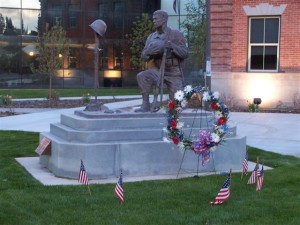
You hear stories about the patriotism of small town USA. The way the community comes together as a single entity to honor its military – those individuals who have served our country. The events always include a bit of flag waving and back patting, “Thank you for your service”. This Memorial Day we had the honor to experience one such town. This is a town, Evanston, Wyoming, which far exceeded any story or past city we have visited.
It was early Sunday evening when we arrived in Evanston. Tony was asked to be the guest speaker at their annual Memorial Day event. We had just returned the day before from Europe. Both of us were more than a bit jet lagged, and I was secretly wishing I was sleeping in my comfy bed back home and wondering what the heck we were thinking when we first accepted the speaking engagement.

As we drove through the streets around town, we noticed flags flying from bridges, street corners, store shops, and of course homes. More flags than we have ever seen. The cemetery was filled with flags and brightly colored flower arrangements. A motorcycle bike rally made the atmosphere even more charged.
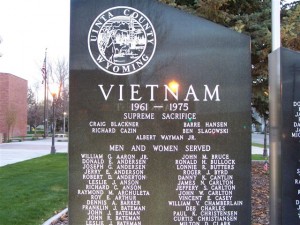
Then we passed a truly humbling sight, the town’s monuments set right in the center of the Court House and Civic Center. Monuments that went way back to the Civil War. The most interesting two tributes were to the Korean and Vietnam conflicts. These were modeled after the Vietnam Wall in Washington D.C. What made them unique, however, was the black granite slabs held the names of every resident of the county who served in the war zone, not just the names of those who had died. The words carved into one stature said it well, “All gave some; some gave all”. Wow! We have never seen a town where every military person was acknowledged. You could trace the heritage of the community’s military generations from WW I forward. Many families had at least four or more last names engraved on each monument. So much sacrifice for a household to bear.

As we listened to the Memorial Day speeches, watched the presentation of flags honoring all military branches, including a flag for the POWs and the MIAs, heard the hallowed sounds of the bagpiper bellowing Amazing Grace, and viewed the solemn and appreciative faces of the people, it was a “lump in the throat” experience. Yes siree, Evanston, Wyoming is truly one of America’s most patriotic towns. It was obvious that such gratitude is a daily way of life, not merely a one day event. They live the words, God Bless America, and God Bless those who serve her mission of freedom and liberty for all.
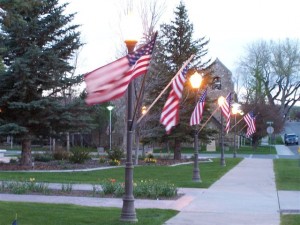
Thank you for sharing your patriotic spirit with us and showing the world that honor, integrity, and flag waving are not political statements, but a way to demonstrate respect for the sacrifice given by the few, so that the many can live in a land of abundance and independence.
Apr
6
Happy Easter
Filed Under Combat PTSD, Easter, Family, PTSD, Tears of a Warrior | Comments Off on Happy Easter

In our family, Easter is a time to gather and celebrate the Good News. Our last blog focused on the challenges often associated with holidays along with some suggestions for making the day less stressful.
We are happy to report that our Easter celebration was wonderful. We had our sons, several of their friends, Jan’s sister, and two extra dogs for the afternoon. At times it could have been a bit hectic, however by following some of our own suggestions the day went quite well.
As the day went on, Tony made his choices based on how he was feeling and what he wanted to do at the time. Since there were a few basketball games on TV as well as a good movie, he had some quiet time in our lower family room. Most of the guests remained upstairs where goodies were arranged for munching and chatting.
Since the weather was warm with plenty of sunshine, after dinner everyone took a long walk, working off some calories and getting the four-legged visitors out for some exercise. Just being outside in the open air was very therapeutic. It is amazing how calming nature can be in normalizing an otherwise busy gathering.
The evening ended with playing our traditional family games which can be quite loud and annoying for some. So Tony once again spent some quiet time reading and watching March Madness.
What is important is that everyone had a good time, had plentiful opportunities to engage in a variety of activities, and made choices that were appropriate for each person. Long ago we stopped apologizing for any person who decides to make an alternative choice for the day. Each person is responsible for him/herself and each person has permission to do what is best for him/her anytime during the celebrations. By reducing unnecessary expectations, the large gatherings go much smoother.
We are so blessed to be able to spend quality time with family and friends. It is important, therefore, that these special occasions turn out to be special because of the good things that occur, instead of some outburst that will be remembered miserably.
Congratulations family! We made it perfectly through another holiday.

